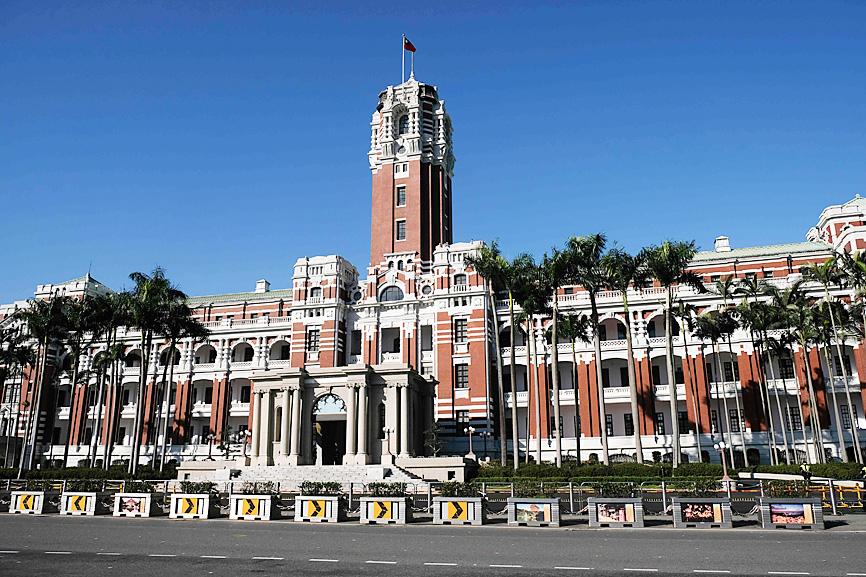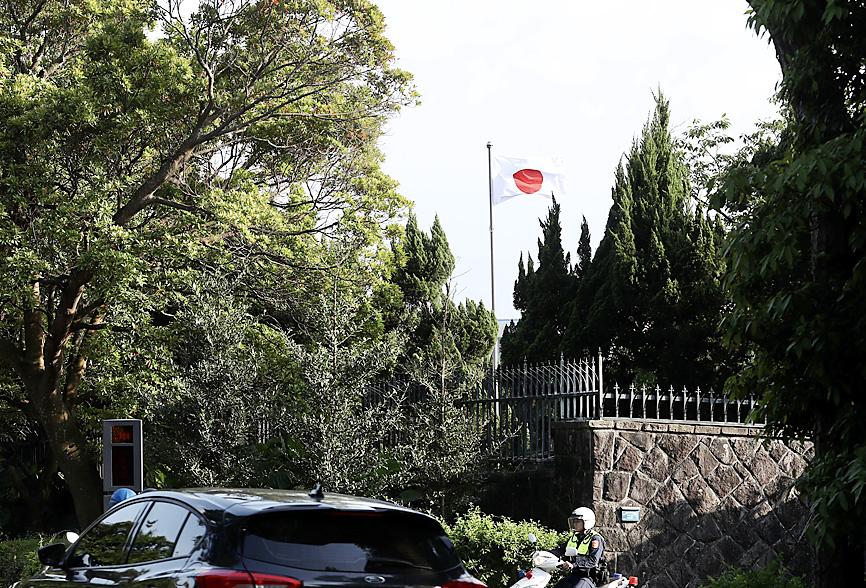The Presidential Office yesterday welcomed a joint statement by the US and Japan that underscores their commitment to peace and stability in the Taiwan Strait.
The statement, issued by the White House after a meeting between US President Joe Biden and Japanese Prime Minister Yoshihide Suga, highlighted the countries’ deepening partnership on defense — including of cyber and space defense — as well as on key technologies, healthcare and the climate.
“We oppose any unilateral attempts to change the status quo in the East China Sea. We reiterated our objections to China’s unlawful maritime claims and activities in the South China Sea,” it said.

Photo: Sam Yeh, AFP
“We underscore the importance of peace and stability across the Taiwan Strait and encourage the peaceful resolution of cross-Strait issues. We share serious concerns regarding the human rights situations in Hong Kong and the Xinjiang Uyghur Autonomous Region,” it added.
The government is glad to see that the US and Japan continue to emphasize the importance of peace and stability in the region, Presidential Office spokesman Xavier Chang (張惇涵) said in a statement yesterday.
Cross-strait relations have become a concern for the Indo-Pacific region and even the world, he said.

Photo: CNA
“We hope that Beijing will fulfill its responsibility ... [and] make positive contributions to regional security and welfare,” he said.
President Tsai Ing-wen (蔡英文) has repeatedly said that Taiwan would not succumb to pressure, nor would it make reckless moves, even if it garners more support, Chang added.
Taiwan, the US and Japan share common values in defending freedom, democracy and human rights, as well as common interests in promoting regional security and prosperity, Chang said, pledging to deepen relations with like-minded partners.
Meanwhile, Japanese Minister of Defense Nobuo Kishi yesterday on Twitter posted photographs of a meeting with soldiers on Japan’s westernmost populated island of Yonaguni.
The photos show him looking toward Taiwan, although he wrote that he could not see it due to the cloudy weather.
Yonaguni is about 110km from Taiwan, and boosting Japan’s southwestern defense system is very important for Japan, Kishi wrote.
During his visit, he has met with Japanese army, navy and air force members on the island, he added.
Separately, Japan-Republic of China Diet Members’ Consultative Council chairman Keiji Furuya yesterday posted a photo on Twitter of Japan’s national flag hoisted in front of a building.
Japanese Representative to Taiwan Hiroyasu Izumi has defied Beijing’s pressure and raised the flag at the Japan-Taiwan Exchange Association in Taipei, Furuya said.
The photograph shows Izumi’s official residence in Taipei’s Yangmingshan area (陽明山), where the envoy started flying the flag in January, the association said.

Conflict with Taiwan could leave China with “massive economic disruption, catastrophic military losses, significant social unrest, and devastating sanctions,” a US think tank said in a report released on Monday. The German Marshall Fund released a report titled If China Attacks Taiwan: The Consequences for China of “Minor Conflict” and “Major War” Scenarios. The report details the “massive” economic, military, social and international costs to China in the event of a minor conflict or major war with Taiwan, estimating that the Chinese People’s Liberation Army (PLA) could sustain losses of more than half of its active-duty ground forces, including 100,000 troops. Understanding Chinese

The Ministry of Foreign Affairs (MOFA) yesterday said it is closely monitoring developments in Venezuela, and would continue to cooperate with democratic allies and work together for regional and global security, stability, and prosperity. The remarks came after the US on Saturday launched a series of airstrikes in Venezuela and kidnapped Venezuelan President Nicolas Maduro, who was later flown to New York along with his wife. The pair face US charges related to drug trafficking and alleged cooperation with gangs designated as terrorist organizations. Maduro has denied the allegations. The ministry said that it is closely monitoring the political and economic situation

UNRELENTING: China attempted cyberattacks on Taiwan’s critical infrastructure 2.63 million times per day last year, up from 1.23 million in 2023, the NSB said China’s cyberarmy has long engaged in cyberattacks against Taiwan’s critical infrastructure, employing diverse and evolving tactics, the National Security Bureau (NSB) said yesterday, adding that cyberattacks on critical energy infrastructure last year increased 10-fold compared with the previous year. The NSB yesterday released a report titled Analysis on China’s Cyber Threats to Taiwan’s Critical Infrastructure in 2025, outlining the number of cyberattacks, major tactics and hacker groups. Taiwan’s national intelligence community identified a large number of cybersecurity incidents last year, the bureau said in a statement. China’s cyberarmy last year launched an average of 2.63 million intrusion attempts per day targeting Taiwan’s critical

AGING: As of last month, people aged 65 or older accounted for 20.06 percent of the total population and the number of couples who got married fell by 18,685 from 2024 Taiwan has surpassed South Korea as the country least willing to have children, with an annual crude birthrate of 4.62 per 1,000 people, Ministry of the Interior data showed yesterday. The nation was previously ranked the second-lowest country in terms of total fertility rate, or the average number of children a woman has in her lifetime. However, South Korea’s fertility rate began to recover from 2023, with total fertility rate rising from 0.72 and estimated to reach 0.82 to 0.85 by last year, and the crude birthrate projected at 6.7 per 1,000 people. Japan’s crude birthrate was projected to fall below six,